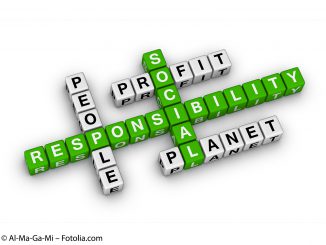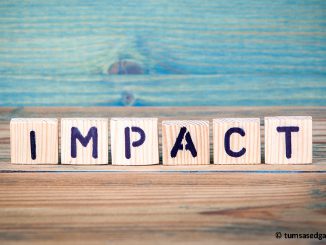
Prof. Dr. Christian Schmidkonz explains why sustainability is no longer enough and why regenerative business is needed instead as the only form of future-oriented economic activity for real change.
The limits of sustainable business
Sustainability is an outdated concept. At least, it is for people and companies who truly want to make the world a better place. Ultimately, the idea of sustainable business has been subjected to such sustained degradation over the years that, today, sustainable business simply means maintaining a bad situation – and not actually helping to improve it. For far too long, we have been consuming more resources than can be naturally regenerated. Sustainable business effectively means that we continue to consume the natural resources of 1.7 Earths every single year – rather than relying on the one Earth we all share.
This is why outdoor clothing brand Patagonia has removed the term sustainability from its corporate vocabulary. Other companies may decide to follow suit, as Patagonia has been a pioneer of environmentally conscious business in the clothing sector for many decades. It is with good reason that its founder, Yvon Chouinard, has inspired dozens of entrepreneurs around the world to remodel their companies as conscious businesses, thereby acting in a more transparent, reflective, responsible and environmentally conscious manner.
The need for a paradigm shift: from sustainable to regenerative business
Today, any company truly committed to building a better future must work with a regenerative focus. This involves a company not only avoiding damage to the environment but also repairing damage caused by business activities over recent centuries. Let’s look at a few examples of companies who have already adopted regenerative business models (or are at least working hard to develop them).
Examples of regenerative businesses
Ecosia – the search engine for tree planting
The online search engine Ecosia uses the majority of its ad revenues to fund tree-planting projects. On average, it plants one tree every 50 searches. Given that a tree absorbs 50kg of CO2 from the atmosphere over a lifespan of 15 years, this means that Ecosia users remove 1kg of CO2 from the atmosphere with every search query. The CO2 emitted by operating its servers is negligible by comparison. In addition, because Ecosia relies on Bing for its search results – and Bing’s provider, Microsoft, has announced its intention not only to become carbon neutral but to have removed all its historical CO2 emissions from the atmosphere by 2050 – Ecosia follows a genuinely regenerative business model. The company generates millions in profits every month and, as of the end of 2021, had used these yields to plant over 140,000,000 trees.
Allbirds – sustainability of shoe soles
Allbirds produces shoes using exclusively naturally materials such as wool and plant-based substances – save for the laces, which are made from recycled plastic. The soles are made from a material called SweetFoamTM, material based on sugarcane and produced in a carbon-negative process. In terms of the materials used, the more shoe soles are produced, the greater the impact in the fight against climate change. Allbirds underscores the fact that, if we are to achieve environmental goals, we must adopt regenerative agriculture rather than the extensive use of conventional agricultural methods. Overall, each shoe produced still contributes to the rise in global CO2 levels – and Allbirds transparently indicates exactly how many kilograms. And, even though the company offsets its CO2 emissions, Allbirds ultimately aims to stop producing CO2 entirely and even become carbon-negative: “We intend to reverse climate change through better business.” Allbirds has also made the life cycle assessment (LCA) tool its uses to calculate its net CO2 emissions freely available on its website as open source software.
As it happens, Allbirds is not alone in providing such tools: Logitech also follows a reduce-renew-restore strategy and publishes its LCA method for interested parties to examine.
Interface – CO2 negative carpet tiles
While Allbirds is still refining its approach, flooring manufacturer Interface (annual turnover > USD 1 billion), has already made it a reality. In 2020, it not only achieved carbon neutrality in production of all its flooring solutions, it even launched the world’s first carbon-negative carpet tiles. Back in 1994, Interface founder Ray C. Anderson set his company the goal of causing no further damage to the environment, taking the entire life cycle of carpet tiles into consideration. Today, Interface has even achieved a negative carbon footprint in respect of the embodied carbon (cradle-to-gate) in its products. Consequently, the more of these carbon-negative carpet tiles are laid in offices around the world, the better it will be for the climate. Interface offsets operational carbon emissions (gate-to-end-of-life emissions) over which is has no influence through certification programs. It takes back all products at the end of their useful life and then puts them back into circulation. In describing its vision, Interface paints the picture of a Factory as a Forest – meaning no smoke-belching chimneys and, rather than simply working sustainably, actually making a positive contribution to improving the environment (through regeneration).
These three examples demonstrate that adopting regenerative business models for commonplace products is possible and, in truth, the only honest objective for a future-focused, environmentally sound strategy.
Differences in the approach and objectives of sustainable and regenerative business
| Sustainable Business | Regenerative Business |
| “Do more with less harm” | “Leave it better than you found it” |
| Uses the resources of 1.7 Earths | Uses the resources of max. 1 Earth |
| Impact: Continued deterioration | Impact: Making a bad situation better |
| Climate-neutral production | Carbon-negative production |
| Overall effect: Neutral (at best) | Overall effect: Net improvement |
Environmental protection as self-protection
Environmentalism doesn’t mean that we (i.e. humans) should protect the environment so that it fares better. Instead, environmentalism means that we can protect ourselves by looking after the environment. There is no separation between us (humans) and it (the environment), as humanity can only survive in a healthy environment. Yet, as a result of industrialization, large parts of the environment are no longer healthy.
In truth, the Earth really doesn’t care whether humans live on it or not. It existed for billions of years before the arrival of Homo sapiens and it will still be here for billions of years to come – with or without humans. After all, the natural world has immense self-healing powers when humans do not intervene. Sir David Attenborough’s film ‘The Year Earth Changed’ is a powerful demonstration of how quickly flora and fauna were able (re-)conquer habitats when a global pandemic forced humanity to retreat indoors, working and living from home. Nature does not need humans – but humans need nature to survive. Sustaining an unhealthy situation is not sufficient. Instead, pursuing regeneration to remedy the damage caused to the planet must become the main paradigm for modern entrepreneurship.
Recommended reading:
- Mackey, J., & Sisodia, R. (2013). Conscious capitalism: liberating the heroic spirit of business. Boston, Mass.: Harvard Business Review Press
- Polman, P., & Winston, A. (2021). Net Positive: How Courageous Companies Thrive by Giving More Than They Take. Boston, Mass.: Harvard Business Review Press
- Stahlhofer, N., Schmidkonz, C., & Kraft, P. (2018). Conscious Business in Germany – Assessing the Current Situation and Creating an Outlook for a New Paradigm. Cham: Springer.
The author is responsible for the content and form of the article.

You are interested in economics and want to acquire in-depth business know-how?
Then the international business degrees at Munich Business School (MBS) are just right for you! At MBS you won’t cram dry theory from old textbooks, but learn in a outcome-oriented way and gain valuable practical experience. Convince yourself:
Bachelor’s in International Business
Master’s in International Business
Master’s in International Business I Finance
Master’s in Innovation and Entrepreneurship
Master’s in International Marketing and Brand Management
Master’s in Sports Business and Communication
MBA General Management
Doctor of Business Administration




